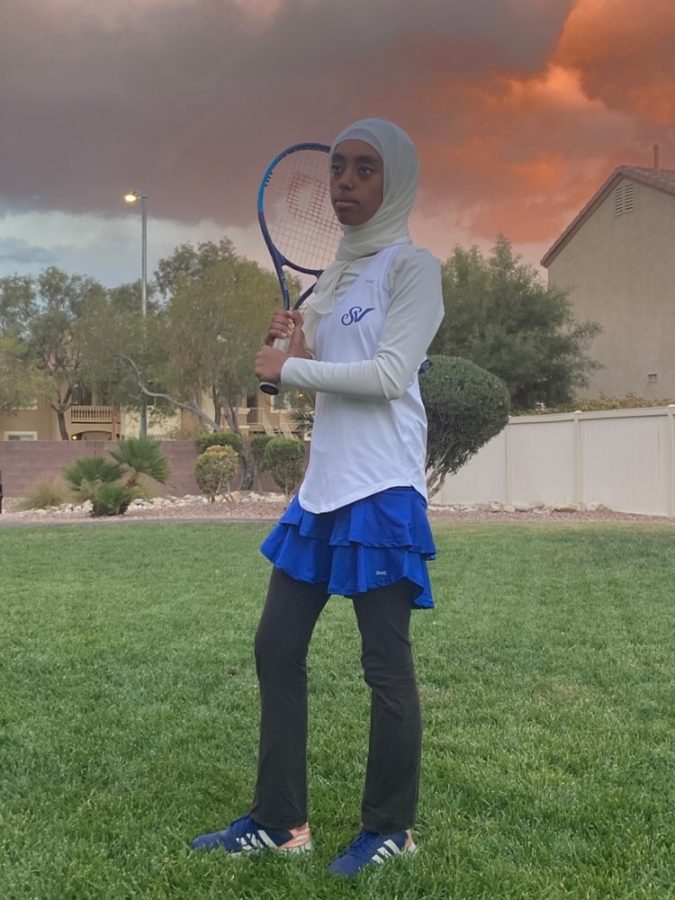Committed Tennis Player: Meet Ihsan Seman
Facing challengers on the court while embracing her culture
Holding up her tennis racket, sophomore Ihsan Seman finishes out a great tennis season. She made many new friendships while still donning her hijab proudly. “I came to play every single day,” Seman said. “I wasn’t forced to do this. I’m dedicated to this sport, and I want to be there.”
November 22, 2022
Few can say they went from playing a sport recreationally to having their team finish second in their division. Sophomore Ihsan Seman is one of those few, and she did it while rocking her hijab.
“I had a fear of being different,” Seman said. “For a while I was self-conscious about being Muslim, and now I was meeting a new group of people. But, my team was very supportive of me and my religion, and the other teams in the league were very nice too.”
Her Sierra Vista teammate, junior Aaralyn Saria, acknowledges Seman’s position and believes because she is a part of the team, she should be treated like everyone else.
“She is the only Muslim girl in the league,” Saria said, “but that doesn’t change the way we think of her. Our coach treats us all equally, and she’s always included with us. I do believe it’s important to be proud of your culture, but we’re all in it to play tennis and win, regardless of our backgrounds.”
Being the only “hijabi,” Seman had to find ways to maintain the team uniform standards while still maintaining her religious standards.
“The tennis uniform is a skirt and a tank top,” Seman said. “I had to wear leggings underneath and sleeves under the tank top which made me different from everyone else, but I didn’t mind. I would keep hoping to see some other Muslim or hijabi; unfortunately, there weren’t any. I wasn’t treated any differently, but it would be nice to see another one playing tennis.”
Seman’s theory is that Muslim girls don’t play due to fear and lack of representation.
“They feel like they’re gonna be ostracized,” Seman said. “That isn’t the case. Most teams are very welcoming and I feel more Muslims should be pushed to play team sports. There is a lack of Muslim women in sports, and I feel think the young female Muslim generation doesn’t believe there is a path in sports for them.”
The barrier that lies between Muslim girls and sports is something that Seman believes should be torn down and that these girls should gain the courage to play.
“A lot of Muslim women are held back from playing sports because it’s not a ‘proper’ thing for us to do,” Seman said. “They have to be able to overcome the mental challenges like understanding that there might be some people who don’t think they should play. This isn’t right, but it might happen and we have to be ready to overcome it and face these people.”
Seman sees these challenges play out in the world. For example, Elnaz Rekabi is an Iranian Olympic rock climber, and she was recently put on house arrest for not wearing her hijab when competing.
“I think it’s very sad something like this is happening,” Seman said. “Islam is a religion that denounces cruel actions, so seeing all these Muslim countries place hard restrictions on women is disturbing. I am proud of my hijab, but that is a choice for a woman to make, and definitely shouldn’t be forced upon anyone.”
The journey of gaining the courage to wear the hijab to playing tennis with her loyal teammates has brought about many positive changes in her life.
“I think going out, getting fresh air, and exercising has really helped me,” Seman said. “I feel more content with myself, I’m doing better in school, I’m physically active, and my social life is great. Tennis has helped me in every aspect of my life, and it has made me much more confident in wearing my hijab and I have big goals for next season.”










Anonymous • Nov 28, 2022 at
Truly Amazing ??
Suhayra A • Nov 22, 2022 at
wow, what a well written post, she made very good points and is a very brave person!!!